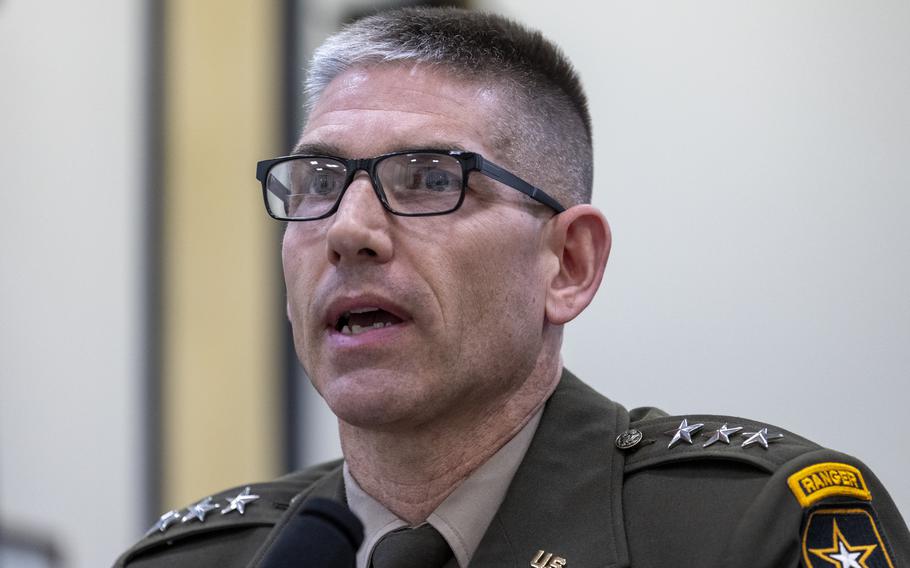
Army Lt. Gen. Brian Eifler, the service’s deputy chief of staff for personnel, testifies April 30, 2025, at a House Armed Services Committee hearing. (Eric Kayne/Stars and Stripes)
WASHINGTON — Tens of thousands of civilian employees who work for the Army, Navy, Air Force, Marine Corps and Space Force are voluntarily resigning as part of the Defense Department’s effort to trim its workforce, forcing the services to restructure to minimize operational gaps.
Personnel chiefs for each of the services told a House Armed Services Committee subpanel on Wednesday that they will feel an impact from the Pentagon’s deferred resignation program and early retirement initiative and are analyzing where the effects will be felt most.
“The civilians maintain an important role for us, for our readiness, for our continuity,” said Lt. Gen. Brian Eifler, the Army’s deputy chief of staff for personnel. “We are doing some reorganization because of that. That’s something we’re looking closely at to make sure we don’t have a gap in our coverage as far as the mission is concerned.”
Defense Secretary Pete Hegseth announced the offers of voluntary separations last month and said mass reductions were necessary to put resources “in the areas where we need them most” and “supercharge our American warfighters.”
Hegseth is aiming to cut the Pentagon’s nearly 900,000 civilians by about 60,000 people. About 21,000 employees volunteered for deferred resignations offered by the Office of Personnel Management earlier this year.
The direct offer by the Defense Department found even more takers.
About 16,000 civilians who work for the Army have signed up for deferred resignations, Eifler said, calling the number “significant.” The Air Force will be losing about 12,000 civilians, according to Lt. Gen. Caroline Miller, the service’s chief of staff for manpower and personnel.
The Navy and the Space Force are expecting to shed about 10% of their civilian personnel. About 1,600 civilians are resigning from the Marine Corps, including some “more senior, more experienced” staff, said Lt. Gen. Michael Borgschulte, deputy commandant for manpower and reserve affairs.
“We’re looking at the impacts of what losing those individuals are and restructuring as appropriate to handle that challenge,” he said.
Miller said she was worried about the effect the resignations will have on recruiting for the Air Force and other military branches.
“If there is an uncertainty about coming into a service, on whether or not you’ll be able to maintain that position, that I think is going to impact,” she said. “We have done tons of work over the last several years to really express the goodness of our service … and a lot of it is job security.”
Vice Adm. Richard Cheeseman, deputy chief of naval operations for personnel, said he was particularly concerned about how the resignations could affect schools and payment systems for sailors.
“We’ve done a lot of work in the last two years in modernizing our pay systems,” he said. “We are, as far as I’m concerned, the gold standard in getting paid transactions on and taking care of sailors. I don’t want to see any impact at all and we’ll be paying attention to that to make sure we mitigate appropriately.”
The Space Force, the military’s youngest and smallest service, is bracing for an outsize impact to its operations.
About one-third of its 17,000-person force is made up of civilians and it relies heavily on the Air Force for support, said Katharine Kelley, deputy chief of space operations for human capital.
“We have to look very carefully at how to mitigate that 10% [loss] and how to be very, very intentional about making sure that does not have a direct mission impact,” she said. “This is going to be a challenge for us.”